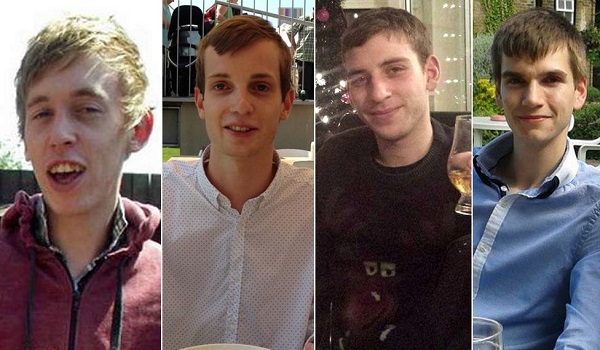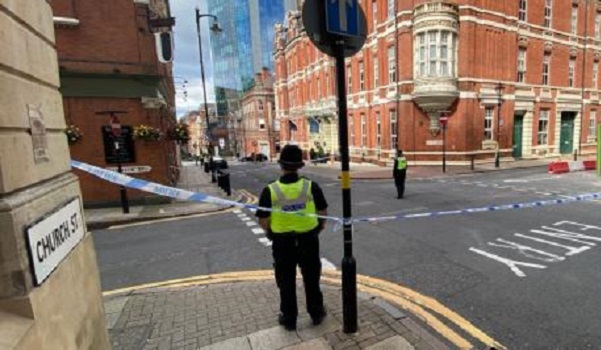Police mistakes ‘probably’ contributed to Port victims’ deaths, inquest finds
Police mistakes “probably” contributed to the deaths of Stephen Port’s victims, an inquest jury has found.
Officers from the Metropolitan Police Service (MPS) based in Barking, East London, missed repeated opportunities to catch sexual predator Port after he plied first victim Anthony Walgate with a fatal dose of date-rape drug GHB and dumped his body.
Port struck three more times before he was caught, killing each of his young, gay, male victims in near-identical circumstances, with police failing to link him to the deaths despite detective work carried out by the victims’ family and friends that would lead them to the culprit.
Jurors at the inquests into the deaths of Mr Walgate, 23, Gabriel Kovari, 22, Daniel Whitworth, 21, and 25-year-old Jack Taylor, concluded that police failings “probably” contributed to the deaths of victims, all of whom were unlawfully killed.
In written conclusions, the jury acknowledged officers’ “heavy workload” but said there were failures that “cannot be overlooked”.
Acknowledging the root-and-branch nature of the mistakes, which originated from the Walgate investigation, the jury said: “We believe there were fundamental failures in these investigations, which were at a basic level.”
The coroner, Sarah Munro QC, said she would write a prevention of future deaths report, to be published in the new year, adding: “These inquests, on any view, have raised a number of serious concerns.”
Addressing the victims’ loved ones at the end of the 50-minute hearing, the coroner added: “May I also express the hope that you have finally been listened to, and you have the answers to, if not all then, some of your questions.”
It followed weeks of hearings at Barking Town Hall in which police admitted failing to carry out basic checks, send evidence to be forensically examined, and exercise professional curiosity during the 16-month killing spree, from June 2014 to September 2015.
Port, 46, a bus depot chef, will die in prison after being handed a whole life sentence at the Old Bailey for the murders and a string of sex assaults.
Since the inquests began, a new alleged victim has come forward to say they believe they were drugged and sexually assaulted by Port in the same period.
The victims’ loved one claimed failings stemmed from prejudice, because the victims were gay and their deaths were drug-related.
Officers had denied it, blaming mistakes on being understaffed and lacking resources, with some acting up in senior positions.
The coroner barred jurors from deciding on the issue of homophobia for legal reasons.
Jurors deliberated for a week before returning their conclusions, after hearing that none of the victims was from the area, and was either anti-drugs or had no known use of GHB.
Mr Kovari’s friend, John Pape, maintained that “institutional homophobia” played a part.
He said: “You have to hope prejudice did play a part. Because if the Met were this incompetent with every serious crime, regardless of the victim’s origin, sexuality or the setting in which they are found, rapists and murderers would be going unpoliced and no one would be protected.”
Mr Whitworth’s partner, Ricky Waumsley, said: “I believe it’s a mixture of everything – so, a bit of laziness, incompetence, lack of training.
“But I absolutely stand by that they were being homophobic towards these four victims and making general assumptions that they’re all young, gay men who take drugs.”
Mr Walgate’s mother, Sarah Sak, said the jurors’ conclusion is a “massive victory” but she is “disappointed” they were not allowed to consider prejudice.
She said: “If Anthony, Gabriel, Daniel and Jack had been girls found in such close proximity there would have been an outcry. There would have been a lot more investigation – and there just wasn’t.”
Mrs Sak called for the Independent Office for Police Conduct to reopen its investigation and for some police officers to be sacked.
Human rights campaigner Peter Tatchell, who raised his concern about a serial killer after the first three deaths in 2014, criticised the police for failing to engage with the LGBT community and follow their own guidance.
He said: “Evidence given at the Stephen Port inquest revealed the police to be incompetent, negligent, unprofessional and homophobic.
“Every gay person who expressed concerns about the deaths was ignored, dismissed and treated with contempt, even the partner of one of the victims. That’s institutional homophobia. The officers involved must face disciplinary action.”
Port’s killing spree began when he hired fashion student Mr Walgate, from Hull, as an escort.
Instead, Port killed him, dragged his body outside and called 999 anonymously, claiming to have found him collapsed as he was passing.
Requests were rejected for a specialist homicide team to take over the case, which was instead left in the hands of borough officers.
Port was swiftly identified as the caller but in a police interview concocted another web of lies.
A basic check on the police national database would have flagged up Port as a suspected rapist and his involvement in a suspicious incident at Barking station days before, the coroner said.
Port’s laptop computer, which would have revealed his obsession with rape pornography, was not examined for many months.
Port was charged with perverting the course of justice and given bail.
It meant he was free to lure Slovakian Mr Kovari to his flat on the false promise of a room to rent.
Port dumped his body in St Margaret’s churchyard, where a dog walker made the grim discovery in August 2014.
Three weeks later, the same dog walker found Kent chef Mr Whitworth in almost exactly the same spot.
Port planted a fake suicide note on his body suggesting Mr Whitworth had accidentally killed Mr Kovari.
Port was later jailed for perverting the course of justice, but was freed to kill Mr Taylor. Mr Taylor’s sisters launched their own investigation and pushed officers to do more.
Responding to the latest developments, MPS Assistant Commissioner Helen Ball said: “Today, after hearing seven weeks of detailed evidence, an inquest jury has determined that Anthony Walgate, Gabriel Kovari, Daniel Whitworth and Jack Taylor were unlawfully killed. They have also found that the deaths of three of those young men – Gabriel, Daniel and Jack – could probably have been prevented had the initial police responses and investigations been better.
“It is a devastating finding. Our thoughts are with everybody who loved these young men. We are so sorry for their loss. And we’re also deeply sorry that there were failings in the police response to the murders. I give my own and the Met’s heartfelt apologies.
“All those who loved Anthony, Gabriel, Daniel and Jack expected a professional and thorough police investigation into their deaths and it is a great sadness for me and everybody at the Met that this didn’t happen. We want to give the families, and Daniel’s partner, the opportunity to talk to us so we can listen to their views and concerns. The Commissioner has offered to meet them personally, as have I, and we will take this forward according to their wishes.
“We’ve been working to rebuild trust in the Met for some time now and we completely accept that people’s trust in us has been damaged by a number of recent events. What has happened in connection with the deaths of these four young men is part of that damage and we know it has a particular impact on communities local to Barking and LGBT+ communities across London.
“And so it’s very important now that we show that we are trustworthy, that we care, that we have changed and that we are learning so that we can work with every person and every community to help protect them. We will examine the jury’s findings very carefully, as we will the recommendations the coroner makes in her report to prevent future deaths, and we will act on those findings and those recommendations.
“The whole of the Met is committed to improving our investigations, our relationships and the trust people have in us. I should say though, that we haven’t waited until now to make changes. We knew we had to change and we’ve been doing just that. We have more and better trained investigators across the entire Met and new structures so intelligence teams, officers on the ground and specialists can work far more closely to identify trends and link crimes much earlier.
“As a direct result of Port’s offences we have a much clearer step by step policy on how we investigate unexplained deaths to ensure we are doing all we should and a far greater understanding of the drug GHB and its use as a weapon to sexually assault. We have strong relationships with LGBT+ people both in our own organisation and across London via our network of advisers who volunteer within their own departments to improve local relationships with LGBT+ communities. We’re working to recruit more advisers and reviewing their role to make sure they are working in the best way possible for our communities. The LGBT+ Independent Advisory Group play a crucial role in building those relationships and improving our policing practice.
“I also want to add that the Deputy Mayor has written to Her Majesty’s Inspectorate of Policing and Fire and Rescue Services to ask them to review aspects of our investigative practices currently, where they link to issues raised by these investigations. She’s written on behalf of the Commissioner and herself so that she and the Commissioner can have that independent assurance that the changes we have made, and we genuinely think we have made, are actually operating today.
“The whole of the Met, and I know I speak for the whole of the Met, is committed to improving our investigations, our relationships and the trust that people have in us. We believe we have been doing just that and it will remain the focus of our leadership in keeping people safe.”







